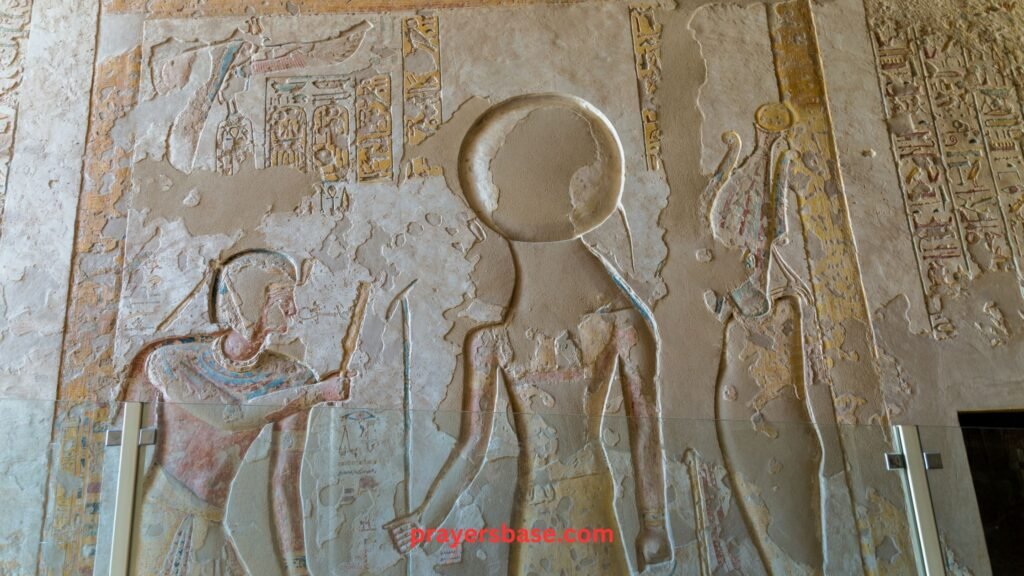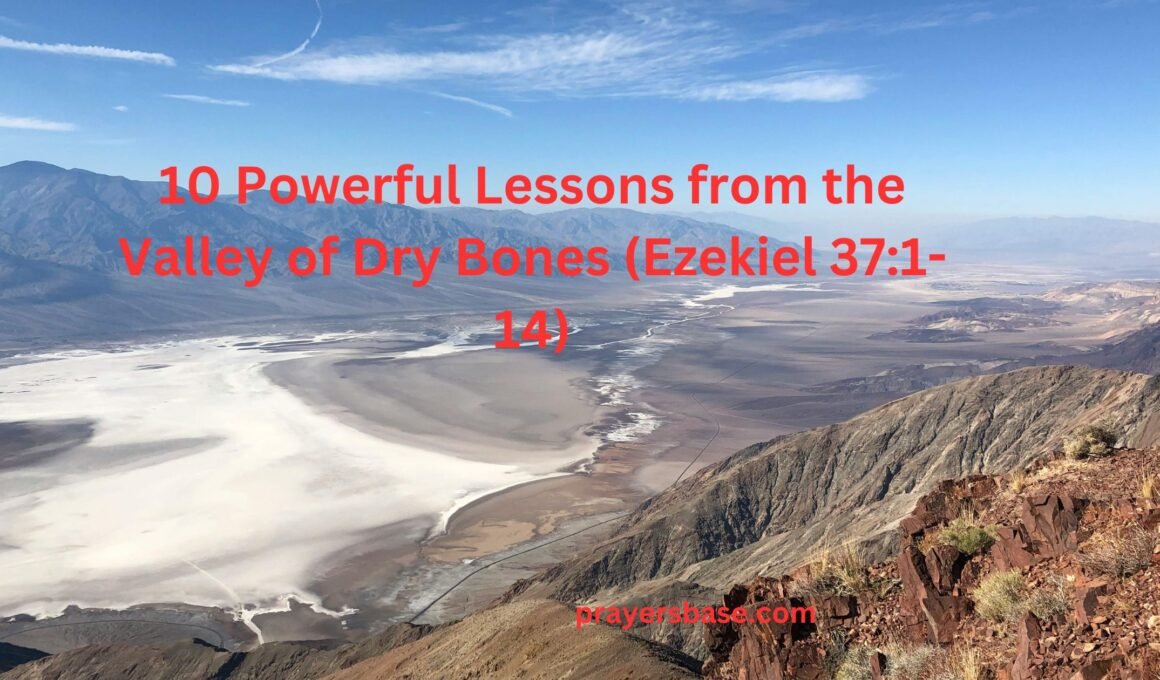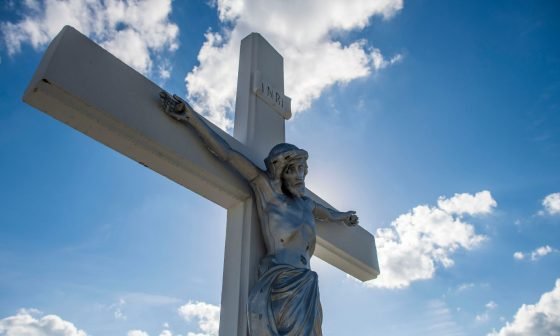The prophet Ezekiel’s vision of a valley filled with dry bones is one of the Bible’s most haunting yet hope-filled passages. It begins with a bleak scene: a sprawling desert valley littered with sun-bleached, dismembered skeletons—bones so dry they crack under the weight of despair.
Yet this vision, given to Ezekiel during Israel’s darkest hour, reveals God’s unmatched power to resurrect what is dead and breathe life into the most hopeless situations.
For modern believers, this passage is more than an ancient prophecy—it’s a lifeline. Whether you’re facing a stagnant career, a broken relationship, or a faith that feels lifeless, Ezekiel 37 reminds us that no valley is too deep for God’s redemption. Let’s journey through this vision and uncover its timeless truths.
Context of Ezekiel 37:1-14
Ezekiel, a priest turned prophet, received this vision around 570 BC while exiled in Babylon. The Israelites had lost their land, their temple, and their sense of identity. They felt like dry bones—spiritually lifeless, disconnected from God’s promises, and trapped in a foreign land.
Key Historical Details:
- Exile as Judgment: Israel’s disobedience led to their captivity (2 Kings 17:7-23).
- Prophetic Role: Ezekiel was called to confront their spiritual apathy and proclaim hope.
- Symbolism of Bones: In ancient Near Eastern culture, unburied bones symbolized utter disgrace and abandonment.
God’s message through Ezekiel was radical: “I will open your graves and bring you up from them” (Ezekiel 37:12). This vision wasn’t just about national restoration—it pointed to the ultimate resurrection through Christ (John 11:25-26).
Why This Passage is Important for Believers Today
In a world drowning in anxiety, division, and despair, Ezekiel 37 offers three transformative truths:
- God specializes in hopeless cases.
- Obedience to His Word activates miracles.
- True revival requires the Holy Spirit’s power.
Whether you’re praying for a prodigal child, a struggling church, or a nation in crisis, this passage teaches us to prophesy life over death and trust God’s timing.
The Meaning Behind the Vision of Dry Bones
The vision unfolds in four stages, each revealing God’s process for restoration:
- The Dry Bones (vv. 1-2): Total desolation—no flesh, no breath, no hope.
- The Prophetic Call (vv. 3-6): God commands Ezekiel to speak life into the bones.
- The Rattling (vv. 7-10): Bones reconnect, flesh forms, but there’s still no breath.
- The Breath of Life (vv. 11-14): The Spirit (ruach in Hebrew) revives the bodies into a mighty army.
This mirrors how God revives us today: He resurrects our dead places spiritually (salvation), relationally (healing), and corporately (revival).
10 Powerful Lessons from the Valley of Dry Bones
The vision of dry bones in Ezekiel 37 is one of Scripture’s most vivid portraits of God’s power to resurrect what seems irredeemable.

These ten lessons, drawn from Ezekiel’s encounter, are not mere theological concepts but lifelines for anyone longing to see God breathe life into their dead places.
From personal renewal to corporate revival, these principles reveal how to partner with the God who specializes in impossible resurrections. Let these truths ignite your hope and equip you to “prophesy to the breath” in every barren season.
1. God Can Bring Life to Any Situation
“I will make breath enter you, and you will come to life.” (Ezekiel 37:5-6) | “The Spirit of God… will also give life to your mortal bodies.” (Romans 8:11)
God’s power defies human logic. The same God who raised Lazarus (John 11:43-44) and Jesus (Matthew 28:6) can resurrect dead marriages, careers, or dreams.
Modern Example: Joni Eareckson Tada, paralyzed at 17, found purpose through Christ and now ministers to millions.
Write down a “dead” area in your life (e.g., a strained friendship). Pray: “Lord, breathe Your life here.”
2. Even the Driest Bones Can Live Again
“Can these bones live?” (Ezekiel 37:3) | “At the scent of water, a dead stick will bud.” (Job 14:7-9, MSG)
God’s question to Ezekiel wasn’t rhetorical—it was an invitation to faith. Dry bones symbolize situations beyond human repair: addiction, grief, or decades of unanswered prayer. Yet God’s power shines brightest in impossible circumstances.
The Israelites crossed the Red Sea after the waters parted (Exodus 14:21-22). Faith often requires stepping into the unknown.
Reflection: What “dry bone” situation have you labeled as hopeless?
3. God’s Word Brings Renewal and Transformation
“Prophesy to these bones!” (Ezekiel 37:4) | “The Word of God is alive and active.” (Hebrews 4:12)
God didn’t revive the bones with a miracle—He used Ezekiel’s obedience to His Word. Speaking Scripture over dead situations isn’t a magic trick; it’s an act of faith that aligns us with God’s will.
Practical Tip:
- Identify a Promise: Choose a verse like Isaiah 43:19 (“I am doing a new thing!”).
- Declare It Daily: Speak it aloud, even if nothing changes immediately.
- Journal Progress: Record small signs of life (e.g., renewed hope, unexpected opportunities).
4. The Power of Prophetic Declaration
“As I prophesied, there was a noise, a rattling!” (Ezekiel 37:7-10) | “The tongue has the power of life and death.” (Proverbs 18:21)
Ezekiel’s words triggered a divine chain reaction: bones rattled, tendons reconnected, and flesh regrew. Likewise, our words shape reality. Gossip breeds chaos, but faith-filled declarations invite God’s intervention.
Prayer Exercise:
“Lord, purify my speech. Help me declare life over my family, workplace, and nation. Amen.”
5. God’s Spirit is Essential for True Revival
“I will put my Spirit in you, and you will live.” (Ezekiel 37:14) | “The Spirit gives life.” (John 6:63)
The bones had flesh but no breath until the ruach (Hebrew for “Spirit/wind/breath”) arrived. Similarly, human effort—therapy, self-help, or religion—can’t replace the Holy Spirit’s life-giving power.
Application:
- Morning Invitation: Start each day with: “Holy Spirit, fill me afresh.”
- Worship: Play instrumental hymns during work to invite His presence.
6. Restoration is a Process, Not Instantaneous
“Tendons, flesh, and skin appeared… but there was no breath.” (Ezekiel 37:7-8)
“Those who wait on the Lord will renew their strength; they will soar on wings like eagles.” (Isaiah 40:31)
God’s restoration often unfolds in stages, mirroring Ezekiel’s vision of dry bones gradually regaining form before receiving life-giving breath. This process teaches us that God values growth over haste. Just as a seed grows invisibly before breaking the soil (Mark 4:26-29), healing in relationships, health, or purpose may take time to manifest.
Joseph’s 13-year journey from betrayal to leadership (Genesis 37–41) was not merely a delay but a divine refining of his character, preparing him to save nations. Similarly, the Israelites’ 40-year wilderness journey transformed a slave mentality into a covenant identity.
Modern Example:
Consider a person recovering from addiction: detoxification is immediate, but true restoration—rebuilding trust, healing emotional wounds—requires years of prayer, counseling, and community support.
Action Step:
Journal the journey. Track small victories in your “valley” (e.g., a kind conversation with a strained relative) as reminders of God’s incremental work.
7. God’s Promises Are for His People
“I will bring you back to the land of Israel.” (Ezekiel 37:12)
“For no matter how many promises God has made, they are ‘Yes’ in Christ.” (2 Corinthians 1:20)
Ezekiel’s prophecy, though directed at Israel, reveals God’s unchanging nature (Malachi 3:6) and His commitment to all believers. Just as Abraham’s covenant (Genesis 17:7) extends through Christ to us (Galatians 3:29), God’s promises—provision, peace, eternal life—are secured by His faithfulness, not our perfection. When doubts arise (e.g., “Has God forgotten me?”), recall David’s cry in Psalm 13 and his eventual declaration of trust.
Reflection:
List three promises God has fulfilled in your life (e.g., answered prayers, provision). How do these affirm His faithfulness in current struggles?
Prayer:
“Lord, help me cling to Your promises when my circumstances scream otherwise. Remind me that You are a covenant-keeper.”
8. We Must Partner with God for Restoration
“Prophesy to the breath!” (Ezekiel 37:9)
“Faith by itself, if it is not accompanied by action, is dead.” (James 2:17)
God invites us into His restorative work, much like Noah building the ark (Genesis 6) or Nehemiah rebuilding Jerusalem’s walls (Nehemiah 4). Ezekiel’s obedience to prophesy—even to lifeless bones—demonstrates that faith requires active participation. While God’s sovereignty initiates revival, our obedience sustains it. This partnership balances trust (“God will provide”) and effort (“I will plant the seeds”).
Action Steps:
- Practical Obedience: Apologize to someone you’ve wronged, even if it’s uncomfortable.
- Community Engagement: Volunteer in a ministry addressing a cause close to your heart (e.g., homelessness, mentorship).
9. Revival is Not Just Personal but Corporate
“A vast army… stood on their feet.” (Ezekiel 37:10)
“All the believers were together… and the Lord added to their number daily.” (Acts 2:44-47)
The dry bones revived as a unified army, not isolated individuals. Similarly, the early church thrived through shared devotion, breaking bread, and prayer (Acts 2:42). Corporate revival ignites when believers intercede together, as seen in the Welsh Revival of 1904, where entire communities repented and transformed.
Church Application:
- Form a Prayer Circle: Gather believers weekly to pray for revival in your neighborhood.
- Unity Initiatives: Partner with other churches for a community service project (e.g., food drives, free clinics).
10. Hope in God Leads to Ultimate Victory
“I will settle you in your own land.” (Ezekiel 37:14)
“May the God of hope fill you with joy and peace as you trust in Him.” (Romans 15:13)
Biblical hope is confident expectation, rooted in Christ’s resurrection (1 Peter 1:3). Israel’s restoration foreshadowed Jesus’ victory over death, assuring us that no “valley” is final. Like Job, who declared, “I know my Redeemer lives” (Job 19:25) amid loss, we anchor our hope in God’s eternal triumph.
Hope-Builders:
- Scripture Memorization: Meditate on hope-filled verses (e.g., Jeremiah 29:11).
- Testimony Sharing: Celebrate God’s past faithfulness in small group settings.
Declaration: “No matter how bleak my valley, Jesus is my hope!”
Living Out the Lessons of Ezekiel 37
The vision of dry bones in Ezekiel 37 isn’t just a historical account—it’s a divine playbook for breathing life into the “dead places” of our lives. To live out these lessons, we must move beyond passive hope to active faith, partnering with God in practical, transformative ways.
Below are actionable steps to apply this prophetic wisdom to your struggles, relationships, and spiritual journey.
How to Speak Life Over Dead Situations
1. Identify the “Valley”: Name the Area Needing Revival
Why it matters: Just as Ezekiel stood in the midst of a literal valley, we must courageously confront our own “valleys”—those areas where hope feels buried. Naming your valley disarms its power and invites God’s light into the darkness.
- Reflection Questions:
- What situation feels lifeless or hopeless? (e.g., a marriage strained by silence, a career stalled by setbacks, or a faith dulled by doubt).
- How has this “valley” impacted your emotional or spiritual health?
- Biblical Example: David named his valleys in the Psalms, crying out, “How long, Lord? Will you forget me forever?” (Psalm 13:1). His honesty paved the way for renewed trust: “But I trust in your unfailing love” (v. 5).
2. Claim Scripture: Declare God’s Promises Over Your Valley
The power of God’s Word: Scripture is a “sword of the Spirit” (Ephesians 6:17), cutting through lies and igniting faith. When you declare verses like “I will not die but live, and will proclaim what the Lord has done” (Psalm 118:17) or “See, I am doing a new thing!” (Isaiah 43:19), you align your heart with God’s perspective.
- Practical Application:
- Write relevant verses on sticky notes and place them where you’ll see them daily (e.g., your mirror, phone lock screen).
- Pair declarations with thanksgiving. For example: “Lord, even in this valley, I thank You that You are making a way.”
3. Persist in Prayer: Fast, Journal, and Worship Until Breakthrough Comes
Why persistence matters: Jesus taught that “we should always pray and not give up” (Luke 18:1), illustrated by the persistent widow. Spiritual breakthroughs often come through seasons of focused prayer, fasting, and worship.
- Create a Prayer Rhythm:
- Fasting: Skip a meal or social media for a week, using that time to pray for your valley.
- Journaling: Track God’s subtle movements. Note moments of peace, unexpected provision, or shifts in your heart.
- Worship: Play songs like “Resurrection Power” or “Great Are You Lord” to shift the atmosphere of your mind and home.
- Community Support: Invite a trusted friend to pray with you. The early church “devoted themselves to prayer” together (Acts 1:14), and breakthroughs followed.
Praying for Spiritual Renewal in Your Life
Sample Prayer:
“Lord, breathe Your life into my weary soul. Revive my passion for You—fan the embers of my faith into flames. Restore my joy, replacing cynicism with childlike wonder. Realign my heart with Your purposes, breaking every chain of fear or distraction. Let Your Spirit overwhelm every area of dryness—my prayer life, my relationships, my dreams. Amen.”
Deepening Your Prayer Practice:
- Break It Down:
- Revive passion: Ask God to reignite your hunger for His Word and presence.
- Restore joy: Pray for a spirit of gratitude, even in hardship (1 Thessalonians 5:18).
- Realign purpose: Surrender your plans to Him, asking, “What step of obedience are You calling me to today?”
- Personalize Scripture: Insert your name into promises. For example: “God, You say in Joel 2:25 You will repay [Your Name] for the years the locusts have eaten. I claim this over my lost time and broken dreams.”
Encouraging Others with the Message of Hope
1. Share Testimonies of God’s Faithfulness
Why testimonies matter: Revelation 12:11 says we overcome “by the blood of the Lamb and the word of our testimony.” Your story of God’s restoration can dismantle doubt in others.
- Action Step:
- Host a coffee chat or small group where people share how God has moved in their valleys.
- Post a testimony on social media with a hashtag like #DryBonesLive or #GodBreathesLife.
2. Send Scripture-Based Encouragement
Beyond cards: While handwritten notes are powerful (e.g., “Isaiah 41:10 reminds me God is with you—He’s strengthening and upholding you”), get creative:
- Voice Message: Send a short audio clip praying a Scripture over someone.
- Care Package: Include a Bible, a worship playlist, and a list of hope-filled verses.
- Acts of Service: Mow a struggling neighbor’s lawn with a note: “This small act is a reminder—God sees you and cares.”
3. Walk Alongside Others in Their Valley
Be a “Ezekiel”: Just as Ezekiel partnered with God to call breath into bones, come alongside others in practical ways:
- Prayer Walks: Offer to pray with a friend in a physical location tied to their struggle (e.g., their home, workplace).
- Resource Sharing: Recommend books like “Get Out of Your Head” by Jennie Allen or “The Circle Maker” by Mark Batterson.
Final Thought:
The dry bones vision isn’t just about your resurrection—it’s about becoming a conduit of God’s life to others. As you speak hope, pray boldly, and encourage those around you, you join Ezekiel’s legacy: ordinary people through whom God sparks extraordinary revival. Your words and actions today could be the breath that helps someone else’s bones rise.
Take Action Now:
- Today: Identify your valley and text a friend to pray with you.
- This Week: Send one encouragement card or voice message.
- This Month: Host a testimony-sharing gathering.
“Do not underestimate the power of a single breath—yours, filled with God’s Spirit, can change a life.”







